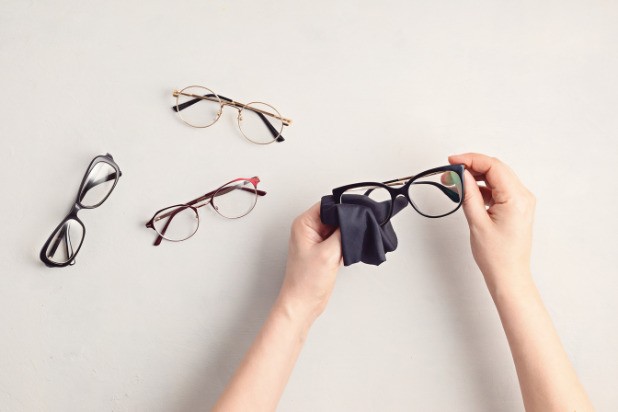Why do my glasses get so dirty

We shed about a gram of skin every day—44 pounds over a lifetime—and your glasses are in very close proximity. Add oils, dust, and other environmental debris to the mix, and it will become clear why your glasses aren’t usually clear.
Reasons Why the Glasses Are Always Smudged
Eyeglasses lenses are made of plastic or types of glass that bend light to clarify your vision. Since eyeglasses help you see clearly, it only makes sense that the lenses fitted to your glasses are clear in color and meant to be free of dirt or debris that could limit your vision. Unfortunately, the clear lenses are worn on your face, and a lot can happen there to smudge your glasses. Keep reading to learn more.
Skin and oils
Everyone sheds skin. Constantly. And a lot of it. The layers of your skin are being continually replaced from the inside out, and as this happens, older layers of skin on the surface flake off. Unfortunately for you and your eyeglasses, this puts your lenses in a sticky situation. Skin flakes and the oils that may travel with them can easily settle on your lenses, creating a film that makes it difficult to see clearly.
Cosmetics or lotions
Since your eyeglasses sit on your nose so close to your skin, anything you put on your skin can also end up on your lenses. This includes lotions, sunscreen, cosmetics, and even natural oils.
Dust and debris
Particles of dust, dirt, vapors, and other debris from the world around us are also settling on your lenses at any given time. This is usually a bigger problem when you are outside, when it’s windy, or when you are working on a messy project. Sanding things, cooking, and yard work all invite bits and pieces of your project onto the surface of your lenses.
Touch
You may not need to leave your glasses on all the time. Taking your glasses on and off, sliding them to the top of your head, or setting them on a table all add to the mess on your lenses. Every time you touch your glasses, you transfer dirt and oils to the lenses, and wherever you store your glasses is also important because of what can land or settle on the lenses.
Fit
How your glasses fit also affects how dirty your lenses get. If your glasses don’t fit properly, you may need to adjust or move them often. As mentioned above, every touch or adjustment transfers dirt and oils from your fingers to your glasses, making smudges. There might not be much you can do if your glasses are not the right shape or fit for your face. Overnight Glasses.com offers a variety of frame sizes and styles that can help you find a better match.
Why is it important to keep glasses clean?

If your glasses are coated with oils, skin flakes, dirt, dust, and other particles that build up, you won’t get a clear view of what is on the other side of your lenses. Smudges and oils can blur your vision, and small specks of dust or dirt can block out areas in your field of vision. Keeping your glasses clean will help ensure you have the clearest, most accurate field of vision. This is especially important when doing tasks requiring clear and complete vision, such as driving.
Tips on cleaning glasses effectively
Keeping your glasses clean seems simple. Wipe away smudges and debris and put them back in place. But there is a right way and a wrong way to clean your glasses, especially if you want to keep your lenses in good shape and make them last.
Start with clean hands
If you’ve been cooking or doing a messy project and bits and pieces, end up on your lenses, grabbing your glasses to clean them won’t help if your hands are also covered. Even when your hands aren’t visibly soiled, there are dirt and oils on them naturally that can transfer to your lenses. Always start cleaning your glasses with freshly washed hands.
Rinse your glasses
Rinsing your glasses under clean water is a good way to start the process. This will help remove larger pieces of debris. You can add a gentle cleaner, such as dishwashing detergent, to help cut through oils and other dirt if needed.
Get both sides
You may think it’s just the outside of your lenses that get dirty, but make sure you wipe both sides of your lenses. Environmental debris may hit the outside of your lenses more easily, but skin and natural oils can coat the inner side of your lenses.
Shake off excess
Glasses are made with all kinds of nooks and crannies. If you’ve run your glasses underwater for the first or last rinse, a gentle shake can help remove droplets that can run onto your lenses after you’ve wiped them dry.
Use soft, non-abrasive cloths
When you do your final dry and polish after cleaning your lenses, use a soft, non-abrasive cloth. Microfiber cloths are ideal because they won’t leave as much lint and debris behind.
Conclusion
Eyeglasses are made clear to let you see through them, making dirt, debris, and smudges on your lenses very noticeable. What kinds of activities do you do while wearing your glasses, what do you use to clean them, and how do they fit into how dirty your glasses get? If your glasses have become scratched or damaged from cleaning, or you need a better fit, it might be time for a new pair of glasses. Overnight Glasses can help you find the right pair with the right fit quickly. Overnight Glasses can also help you have the lenses in your favorite frames replaced.
